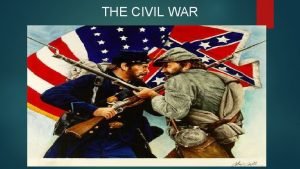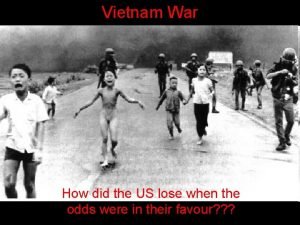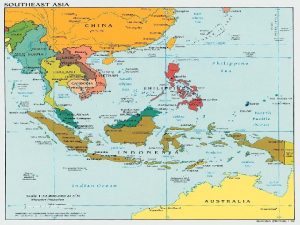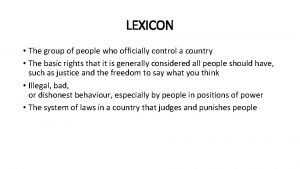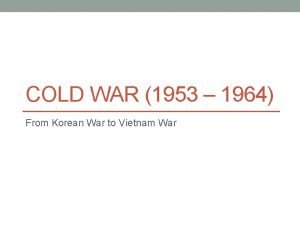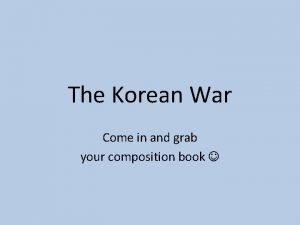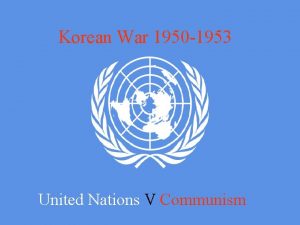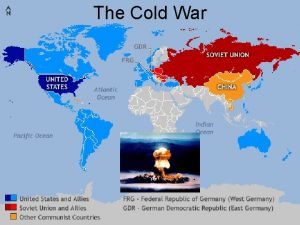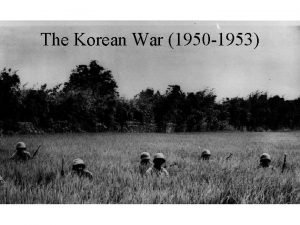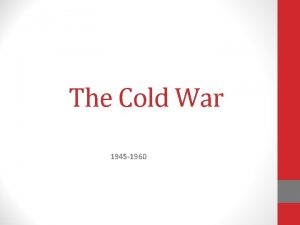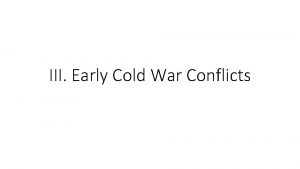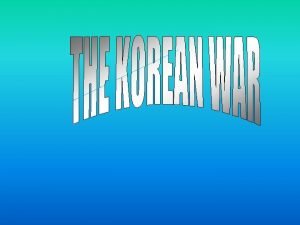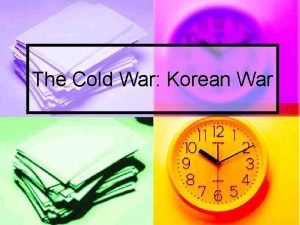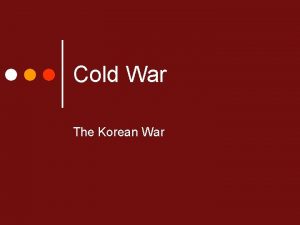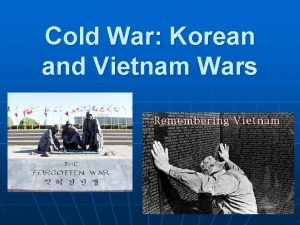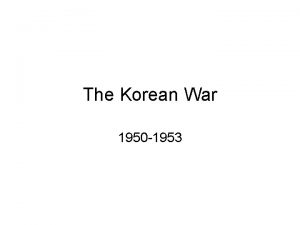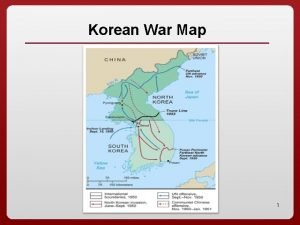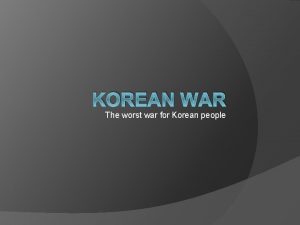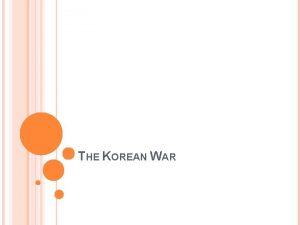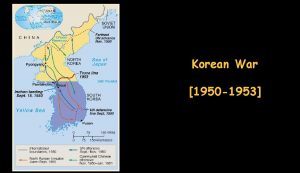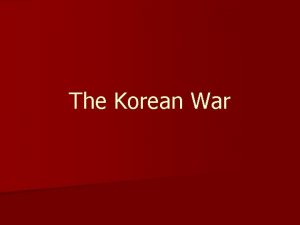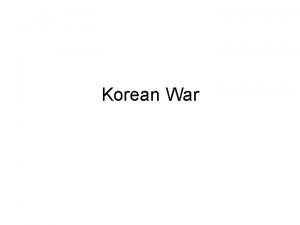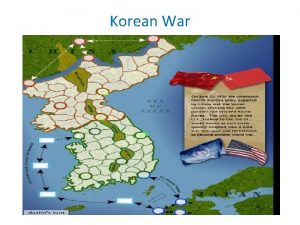Wrap up the Korean War Officially the Korean















- Slides: 15

Wrap up the Korean War • Officially, the Korean War is a U. N. “Police action. ” • Before it’s over 16 nations will send troops in support of the UN. But the U. S. will do the vast majority of the fighting. • It will be a limited war.

Course of Events 1. 2. 3. 4. 5. 6. North Korea attacks South Korea (and U. S. forces). The U. S. forces counter attack. The U. S. crosses the 38 th parallel and then pushes North Koreans toward Chinese border. Surprise! The communist Chinese forces attack the U. S. in huge numbers. They push the U. N. forces back toward the 38 th parallel. President Truman fire Gen. Douglas Macarthur for insubordination. The war reaches a stalemate and peace negotiations begin.

The significance of the Korean War • The cease fire was signed in the summer of 1953. • Most obvious we prevented the communist take over of South Korea. • In Korea the U. S. demonstrated that we would stand by our allies. • This increased Communist prestige throughout Asia. • We entered into an age of hostility in Asia because China fought the U. S. to a stand still in Korea.

Before the Korean War • Commitments to defend only two places: – Japan – Philippines • During and after the Korean War the U. S. signed treaties of mutual defense with dozens of little small countries in Asia and the Pacific (Vietnam) • Also signed with Canada & Mexico to protect ourselves

President Dwight Eisenhower • This election played a major role in the cease fire in the Korean War. • Right after the election and before IKE took office Eisenhower quickly appointed his Secretary of State John Foster Dulles. • Dulles and Eisenhower played good cop / bad cop. Dulles bad cop/Eisenhower good cop

Eisenhower is not what you would expect • He was anti-militarist • He inherited the Korean War and ended it in 6 months. • For the next 7 years not one man died from a foreign bullet. • Nuclear War was a unthinkable concept. • Reduced the size of the military • Began a relationship with the Soviet Union – Stalin died and a group of more lenient men came into office. Nikita Khrushchev.

Ultimate Legacy • “the Korean War increased fear of Communist aggression and prompted a hunt for spies on whom to blame Communist gains. ” • “Soft on Communism”

DURING THE KOREAN WAR • H-bomb (Hydrogen bomb) – a thermonuclear weapon is developed. – U. S. exploded on Nov. 1 st 1952. – U. S. S. R. exploded in Aug. 1953. A-Bomb in 1949. • “Total Victory now might mean total annihilation. ” Peter Jennings.

The History of the Cold War 1940’s 1950’s 1960’s 1970’s 1980’s Containment Brinkmanship Peaceful Detente Reagan Era Co-existance Brinkmanship- the practice of threatening an enemy with massive military retaliation for any aggression.

• Arms Race – Fallout shelters – Fear of nuclear war for the next 30 years. • CIA was created: Central Intelligence Agency. – Covert actions in Iran. – Covert action in Guatemala

• In 1955, West Germany was allowed to join NATO and was rearmed. – Soviet response is the Warsaw Pact. (next page) • Summit in Geneva in 1955. – “open skies proposal. • Crisis in the Middle East over the Suez Canal. • Soviet Aggression in Hungary in 1956. • Israel & Iran - the U. S. would defend the Middle East against attack by a Communist country. – Warning in 1957.


COLD WAR AFFECTS SCIENCE AND EDUCATION • ICBM- Intercontinental Ballistic Missile • Oct. 4 th 1957 Sputnik – Falling behind? ? ? – Science and Math. – Finally on Jan 31, 1958, the U. S. launched its 1 st satellite. • U-2 incident – A high altitude plane used to spy on the enemy. – Khrushchev denounces Eisenhower. • 1960’s opened with tension between the 2 superpowers as high as ever.

In the late 1950 s, the CIA began secret high-altitude spy missions over Soviet territory The U-2’s infra-red cameras took detailed pictures of Soviet troop movements & missile sites

U-2 SPY PLANE SHOT DOWN OVER USSR Powers was released in 1962 in exchange for convicted Soviet spy Rudolph Abel On May 1, 1960, Gary Power’s U-2 spy plane was shot down over Soviet territory Powers parachuted into Soviet territory, was captured and sentenced to 10 -years in prison Because of this incident, the 1960 s opened with tension between the two superpowers as great as ever
 The civil war
The civil war Description
Description Reconstruction venn diagram
Reconstruction venn diagram The philippines officially known
The philippines officially known The group of people who officially control a country
The group of people who officially control a country The korean war
The korean war Cause of korean war
Cause of korean war Korean war
Korean war Cause of korean war
Cause of korean war Cause of korean war
Cause of korean war Korean war
Korean war Korean war summary
Korean war summary Korean war
Korean war Cause of korean war
Cause of korean war Nsc68
Nsc68 Agent orange map korea
Agent orange map korea
